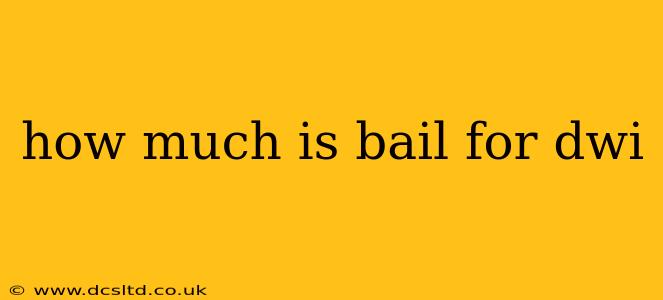How Much is Bail for a DWI? A Comprehensive Guide
The cost of bail for a Driving While Intoxicated (DWI) charge varies significantly depending on several factors. There's no single answer to "How much is bail for a DWI?", as it's determined on a case-by-case basis. This guide will break down the key factors influencing bail amounts and offer insights into navigating this complex legal process.
What Factors Determine DWI Bail Amounts?
Several factors influence the judge's decision when setting bail for a DWI charge. These include:
-
The Severity of the Offense: A first-time DWI with a low blood alcohol content (BAC) will generally have a lower bail than a repeat offense involving a significantly higher BAC, accidents, injuries, or refusal to take a breathalyzer test. Aggravating factors, such as reckless driving or high speeds, can dramatically increase the bail amount.
-
Your Criminal History: A clean record will often result in a lower bail than someone with prior DUI/DWI convictions or other criminal offenses. Judges consider your history as an indicator of the likelihood of future offenses.
-
Your Ties to the Community: Strong ties to the community—stable employment, family connections, property ownership—can demonstrate a lower risk of flight and may lead to a lower bail amount. Conversely, lacking such ties might result in a higher bail or even pretrial detention.
-
Jurisdiction: Bail amounts vary widely across different states, counties, and even individual courts. Laws and judicial practices differ significantly, leading to inconsistencies in bail settings.
-
The Judge's Discretion: Ultimately, the judge has considerable discretion in setting bail. While guidelines may exist, the judge considers all the above factors and makes a judgment call based on the specific circumstances of your case.
What are the Common Types of DWI Bail?
Several types of bail are commonly used in DWI cases:
-
Cash Bail: This involves paying the full bail amount in cash. Upon successful completion of the legal proceedings, the money is returned.
-
Surety Bond: You pay a percentage of the bail amount to a bail bondsman, who then posts the full amount to the court. This is a more affordable option, but you pay a fee to the bondsman.
-
Property Bond: You use the equity in your property (like a house or land) as collateral for the bail. If you fail to appear in court, the court can seize the property.
-
Release on Recognizance (ROR): This involves being released without posting any bail. The court believes you are a low flight risk and will appear for court appearances. This is less common in DWI cases, especially repeat offenses.
How Much Does a DWI Bail Bondsman Cost?
If you use a bail bondsman, you typically pay a non-refundable fee, usually 10-15% of the total bail amount. This fee is paid upfront to secure your release.
What Happens If I Can't Afford Bail?
If you cannot afford bail, you have options. You can seek legal counsel to explore alternatives, such as requesting a reduction in bail or exploring public defender services. Your lawyer can advocate for you in court and help you navigate the process.
Can I Get My Bail Reduced?
Yes, it's possible to request a bail reduction. Your attorney can file a motion with the court, presenting evidence that supports a lower bail amount. This often involves demonstrating stronger community ties, presenting evidence of your unlikely flight risk, or highlighting mitigating factors in your case.
What if I Miss a Court Appearance After Being Released on Bail?
Missing a court appearance after being released on bail is a serious offense. It could lead to the forfeiture of your bail, the issuance of a warrant for your arrest, and additional charges.
This information is for educational purposes only and does not constitute legal advice. Always consult with a qualified legal professional for advice tailored to your specific situation. The complexities of DWI laws and bail procedures necessitate seeking expert legal guidance.
